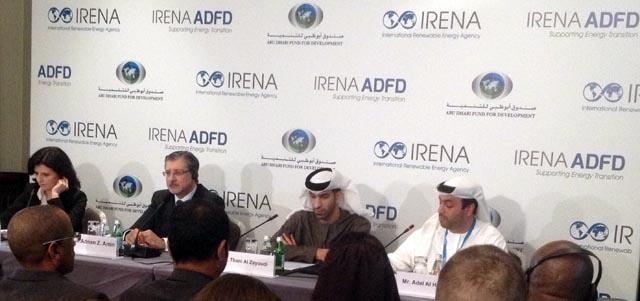FRANKFURT — Sub-Saharan Africa is becoming increasingly attractive for foreign investors, even if a lack of infrastructure and other factors are holding back growth in the region, a Commerzbank study found Thursday.
"Persistently low global economic growth has not affected sub-Saharan Africa much so far," the German bank wrote in the study.
"The international financial crisis has barely touched the region. With real economic growth of 5 per cent in 2013 and an anticipated 6 per cent in 2014, the region ranks number two behind Asia" among the world's most dynamic regions, Commerzbank pointed out.
The countries in the region, with their wealth of raw materials, are benefitting from high commodity prices and are becoming lucrative growth markets that are awaking international interest.
"Even if there are still deficits in individual countries in democratisation and the efficiency of political institutions, political and economic stability has increased," the study found.
Rainer Schaefer, head of Commerzbank's country risk analysis, stressed that improvement and expansion of infrastructure were key to raising the economic dynamism and boosting exports from the region.
To meet its fast-growing energy needs, sub-Saharan Africa could become a key player in environmentally friendly and cost-efficient energy technology, suggested Florian Witt, head of Commerzbank's Africa department.
"There are plenty of opportunities for foreign investors with corresponding know-how in the areas of solar and wind technology and even biogas, " Witt indicated.
Separately, China has brought cheap consumer goods, roads and schools to many parts of Africa over the last decade but the continent's leaders are increasingly pushing for it to provide more of what many Africans want most: jobs.
From Pretoria to Abuja, governments have begun voicing frustration that China's use of Africa as a source of natural resources and a market for its goods may be hindering the continent haul its billion people out of poverty.
A recent report by the UN Economic Commission for Africa (UNECA) highlighted the risk that the continent's relationship with the world's second largest economy could strangle its attempts to industrialise.
China's trade with Africa ballooned from $10 billion in 2000 to an estimated $200 billion last year — four years after it overtook the United States as the continent's largest partner.
But some 85 per cent of China's exports from Africa are raw materials, such as oil and minerals. According to the African Development Bank, most minerals mined in Africa are exported raw, meaning the jobs and wealth from processing them is created elsewhere.
A flood of Chinese produce, meanwhile, has accelerated the decline in industrialisation since the 1980s. Africa's textile industry alone lost 750,000 jobs over the last decade, according to the Johannesburg-based Brenthurst Foundation.
Even in the continent's manufacturing powerhouse South Africa, some 40 per cent of footwear and fabrics come from China.
Expressing the concerns of many African governments, South African President Jacob Zuma bluntly warned that such an unbalanced pattern of trade was "unsustainable".
"The romanticised relationship surrounding China's investment in Africa has passed," said Alex Vines, head of the Africa programme at the Chatham House Research Institute.
"With the world's youngest and fastest-growing population, the main pressure on governments in Africa is to provide jobs. Having the Chinese take those jobs doesn't help," he added.
Vying for jobs
It is true China's boom has brought many benefits to Africa. Beijing has won fulsome praise from many governments for its willingness to finance massive infrastructure projects without conditions relating to democracy, governance and human rights — the "strings" Africa has often criticised in aid from the West.
Chinese economic growth rates averaging 10 per cent a year for almost a decade fuelled a commodities "super-cycle" which has lifted Africa's own growth to unprecedented rates.
And the cheap Chinese goods being imported help make everyday living more affordable and develop the consumer sector across the continent.
But in many countries, China's demand for ore, timber and oil is forcing African states to specialise at the bottom of the value chain in areas with low productivity gains, UNECA said.
With Africa supplying one-third of China's oil, much of it from Angola, UNECA highlighted the risk of “Dutch Disease” whereby demand for raw materials inflates a currency, making other sectors uncompetitive against foreign competition.
Even in Senegal, an arid West African country not usually associated with the “resource curse”, domestic peanut processing factories face the threat of being driven out of business as Chinese exporters buy up the crop to ship home.
Attempts to legislate for industrialisation, such as bans on the export of unprocessed logs from Gabon and Mozambique, have often proved fruitless. In Gabon, where Beijing has broken French dominance over logging, an estimated 60 per cent of timber is exported illegally to China.
According to respected Nigerian Central Bank Governor Lamidu Sanusi, China's extraction of resources from Africa had all the attributes of "colonialism".
In an apparent response to such criticism, Chinese President Xi Jinping stressed during an African tour last year that his country was seeking a win-win partnership.
"The development of China will be an unprecedented opportunity for Africa, and Africa's development will be the same for my country," he told lawmakers in Congo Republic.
Beijing has provided much-needed capital to a continent starved of investment. The China Import-Export Bank is the continent's largest creditor and Beijing has promised $20 billion more in loans over the next three years.
But Beijing's money comes with its own strings: it must be spent on Chinese goods or Chinese-built infrastructure. And Chinese firms often source their supplies and workers back home.
The number of Chinese in Africa has increased tenfold over the last 20 years to an estimated one million. From shopkeepers in Malawi to prostitutes in Cameroon, Africans complain that Chinese competition is making life tougher.
Unlike Western immigrants, the Chinese diaspora comes from the poorest section of society and competes directly for work with Africans, some 80 per cent of whom are in "vulnerable employment" according to the International Labour Organisation.
In Ghana, tensions flared into violence last year when police and residents attacked artisanal Chinese goldminers, claiming they were driving locals out of the industry. Many Chinese were brutally beaten and some 200 were deported.
Frustration has also emerged with the operating practices of some Chinese firms. In Gabon, Chinese refiner Sinopec's Addax Petroleum is embroiled in a $1 billion legal dispute over an oil licence after the government alleged it failed to pay customs duties and respect other laws.
Zambia, where Chinese mines have a record of violent labour disputes, revoked three licences for the Chinese-owned Collum coal mine, alleging non-payment of royalties taxes, and poor environmental and safety records.
"Now more countries are engaging with Africa, there are more options. Several countries are looking at Chinese investment with a more critical eye," indicated Razia Khan, head of Africa research at Standard Chartered Bank. "There will be more and more scrutiny of these contracts."
Responding to the criticism from Nigeria and South Africa, China's commerce ministry has encouraged firms to increase investment in Africa. China is launching Special Economic Zones for manufacturing companies on the continent.
Though it is Africa's largest trading partner, China has only 6 per cent of the stock of foreign investment — well behind France on 18 per cent — according to UN trade body UNCTAD.
Nigeria’s finance minister has urged African countries to woo Chinese manufacturing firms into offshoring their production as their domestic labour costs rise.
"We need to prepare ourselves to provide a welcoming home for some of the industries where the Chinese will no longer be competitive," she told a conference in London last year.














